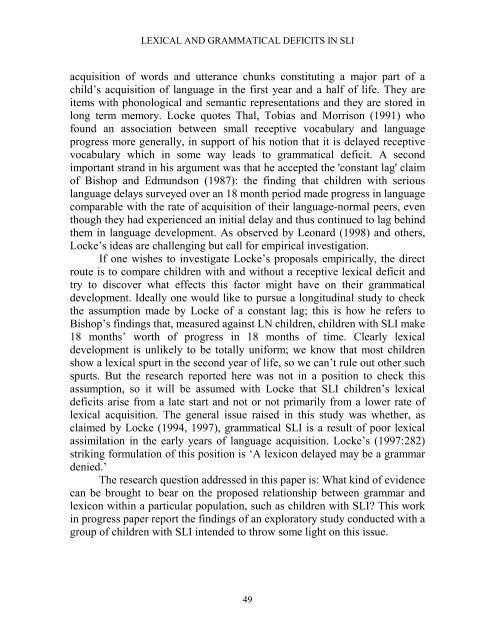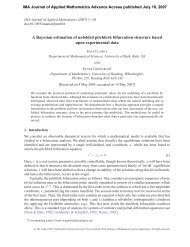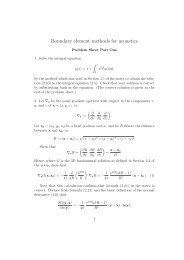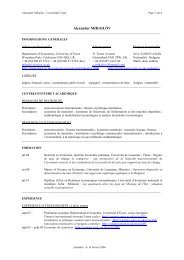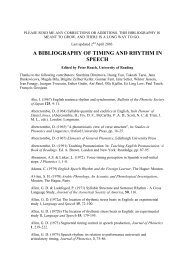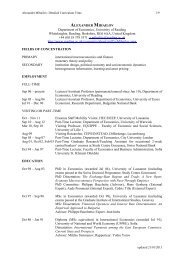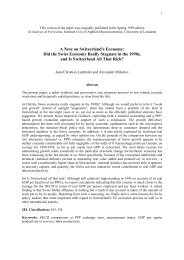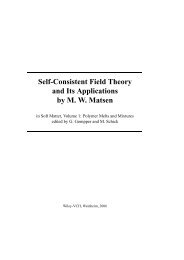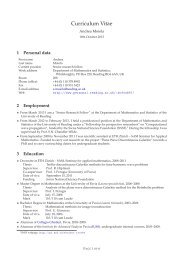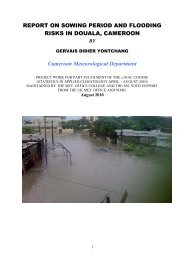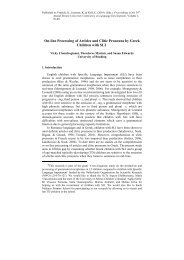Reading Working Papers in Linguistics 4 (2000) - The University of ...
Reading Working Papers in Linguistics 4 (2000) - The University of ...
Reading Working Papers in Linguistics 4 (2000) - The University of ...
Create successful ePaper yourself
Turn your PDF publications into a flip-book with our unique Google optimized e-Paper software.
LEXICAL AND GRAMMATICAL DEFICITS IN SLI<br />
acquisition <strong>of</strong> words and utterance chunks constitut<strong>in</strong>g a major part <strong>of</strong> a<br />
child’s acquisition <strong>of</strong> language <strong>in</strong> the first year and a half <strong>of</strong> life. <strong>The</strong>y are<br />
items with phonological and semantic representations and they are stored <strong>in</strong><br />
long term memory. Locke quotes Thal, Tobias and Morrison (1991) who<br />
found an association between small receptive vocabulary and language<br />
progress more generally, <strong>in</strong> support <strong>of</strong> his notion that it is delayed receptive<br />
vocabulary which <strong>in</strong> some way leads to grammatical deficit. A second<br />
important strand <strong>in</strong> his argument was that he accepted the 'constant lag' claim<br />
<strong>of</strong> Bishop and Edmundson (1987): the f<strong>in</strong>d<strong>in</strong>g that children with serious<br />
language delays surveyed over an 18 month period made progress <strong>in</strong> language<br />
comparable with the rate <strong>of</strong> acquisition <strong>of</strong> their language-normal peers, even<br />
though they had experienced an <strong>in</strong>itial delay and thus cont<strong>in</strong>ued to lag beh<strong>in</strong>d<br />
them <strong>in</strong> language development. As observed by Leonard (1998) and others,<br />
Locke’s ideas are challeng<strong>in</strong>g but call for empirical <strong>in</strong>vestigation.<br />
If one wishes to <strong>in</strong>vestigate Locke’s proposals empirically, the direct<br />
route is to compare children with and without a receptive lexical deficit and<br />
try to discover what effects this factor might have on their grammatical<br />
development. Ideally one would like to pursue a longitud<strong>in</strong>al study to check<br />
the assumption made by Locke <strong>of</strong> a constant lag; this is how he refers to<br />
Bishop’s f<strong>in</strong>d<strong>in</strong>gs that, measured aga<strong>in</strong>st LN children, children with SLI make<br />
18 months’ worth <strong>of</strong> progress <strong>in</strong> 18 months <strong>of</strong> time. Clearly lexical<br />
development is unlikely to be totally uniform; we know that most children<br />
show a lexical spurt <strong>in</strong> the second year <strong>of</strong> life, so we can’t rule out other such<br />
spurts. But the research reported here was not <strong>in</strong> a position to check this<br />
assumption, so it will be assumed with Locke that SLI children’s lexical<br />
deficits arise from a late start and not or not primarily from a lower rate <strong>of</strong><br />
lexical acquisition. <strong>The</strong> general issue raised <strong>in</strong> this study was whether, as<br />
claimed by Locke (1994, 1997), grammatical SLI is a result <strong>of</strong> poor lexical<br />
assimilation <strong>in</strong> the early years <strong>of</strong> language acquisition. Locke’s (1997:282)<br />
strik<strong>in</strong>g formulation <strong>of</strong> this position is ‘A lexicon delayed may be a grammar<br />
denied.’<br />
<strong>The</strong> research question addressed <strong>in</strong> this paper is: What k<strong>in</strong>d <strong>of</strong> evidence<br />
can be brought to bear on the proposed relationship between grammar and<br />
lexicon with<strong>in</strong> a particular population, such as children with SLI? This work<br />
<strong>in</strong> progress paper report the f<strong>in</strong>d<strong>in</strong>gs <strong>of</strong> an exploratory study conducted with a<br />
group <strong>of</strong> children with SLI <strong>in</strong>tended to throw some light on this issue.<br />
49


